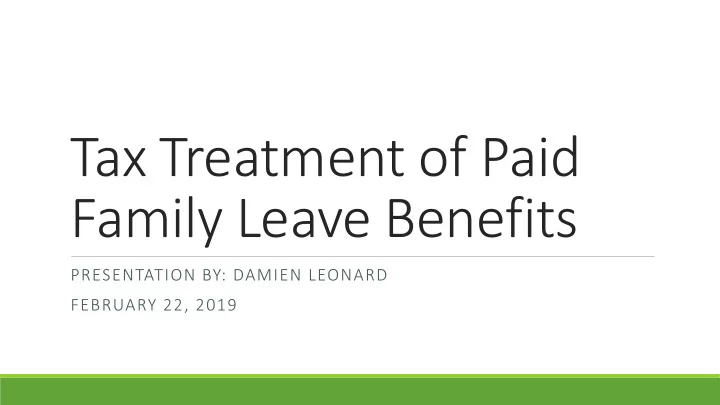

Tax Treatment of Paid Family Leave Benefits PRESENTATION BY: DAMIEN LEONARD FEBRUARY 22, 2019
Comparison of Taxes on Disability Benefits State Own Disability State Tax Federal Tax Social Security/ Medicare/ FICA CA No, except when No, except when No considered a substitute for considered a substitute for UI UI NJ Employer Portion: Yes/ Employer Portion: Yes/ FICA on employer portion, Employee Portion: No Employee Portion: No not on employee portion RI No No No NY Employer Portion: Yes/ Employer Portion: Yes/ FICA on employer portion, Employee Portion: No Employee Portion: No not on employee portion H.107 Employer Portion: Yes/ Employer Portion: Yes/ FICA on employer portion, (as amended by Employee Portion: No Employee Portion: No not on employee portion HGHMA) Workers’ Comp No No No
Comparison of Taxes on Family Care Benefits State Family Care State Tax Federal Tax Social Security/ Medicare/ FICA CA No (Contributions post-tax) Yes (Contributions No deductible) NJ No (Contributions post-tax) Yes (Contributions No deductible) Yes (Contributions Yes (Contributions RI No deductible) deductible) NY Yes Yes (Contributions to State No plan deductible) H.107 Yes Yes (Contributions No (as amended by deductible) HGHMA) Unemployment Yes Yes No
Frequently Asked Questions How are benefits taxed to an employee when they are paid out? Benefits are taxable if considered unemployment compensation. ◦ Benefits provided for family care and bonding are considered unemployment compensation. Benefits are non-taxable if considered disability-based compensation. ◦ Benefits paid for an employee’s own disability are considered disability -based compensation. Are the Contributions for Paid Family Leave Benefits Pre-Tax or Post-Tax? Employee contributions to a family leave program are deductible as a state income tax. State income taxes are paid with post-tax dollars; therefore, the employee contributions are paid from post-tax dollars.
Frequently Asked Questions How are employee contributions taxed? Employee contributions are treated as a payment of a State income tax. Deductible as an itemized deduction on federal taxes. ◦ Recent federal tax changes have reduced the likelihood that an individual will itemize deductions. Family and Medical Leave benefits for non-itemizers are only taxed on amounts received in excess of the employee’s contribution; benefits for itemizers are taxed on all benefits (while allowing the deduction). Employee contributions are not deductible on State level, because Vermont does not allow itemized deduction for State taxes.
Frequently Asked Questions Would employee contributions affect property tax income sensitivity? Income sensitivity starts with federal adjusted gross income and there are no applicable exclusions. Therefore, employee contributions would likely count as income for purposes of calculating income sensitivity. Are FICA (Social Security and Medicare) taxes due on the benefits received by an employee? Potentially. FICA is due on wages paid by an employer and on disability benefits financed by an employer. Under H.107, Family and Medical Leave Insurance benefits would be jointly financed by employers and employees and therefore FICA contributions would be due in relation to the portion of the benefits financed by the employer. Benefits provided for bonding leave or family care are not considered wages and therefore are not subject to FICA.
Frequently Asked Questions How would a mandatory employer contribution be treated for tax purposes? Most likely treated as a deductible state tax for both unemployment or disability based compensation. How would a voluntary employer contribution be taxed? For disability-based compensation, a voluntary employer contribution would likely be considered deductible to the employer as a business expense, and taxable to the employee to the extent of the employer contribution. For family care and bonding benefits, the payment would likely be considered deductible to the employer as a business expense, and taxable to the employee.
Frequently Asked Questions Would Employers be Eligible for the Federal Employer Credit for Paid Family and Medical Leave? No. The federal tax credit for benefits paid in relation to an employer-provided paid family leave program does not apply to “any leave which is paid by a State or local government or required by State or local law.” In addition, without further Congressional action, the tax credit is set to expire on December 31, 2019 and the benefits proposed in H.107 would not become available until October 1, 2021.
Any Questions?
Recommend
More recommend